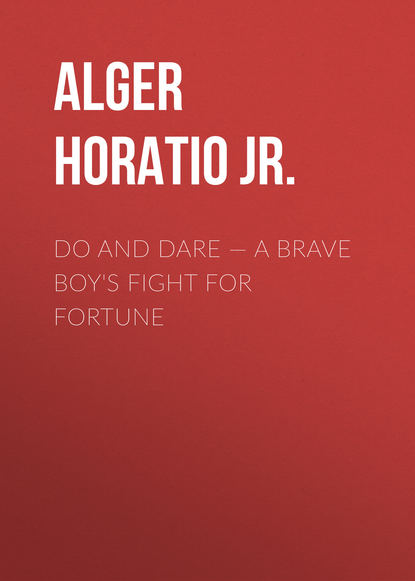По всем вопросам обращайтесь на: info@litportal.ru
(©) 2003-2025.
✖
Do and Dare — a Brave Boy's Fight for Fortune
Настройки чтения
Размер шрифта
Высота строк
Поля
“That might be.”
“And he did not confine himself to the Western country, but might be met with in New York, or St. Louis. We met the colonel in Chicago.”
“It may be as you surmise, Herbert,” said George Melville, after a pause. “It did occur to me that our worthy landlord might be the famous outlaw in question, but the description to which you refer seems to fit the colonel better. There is one thing, however, that makes me a little incredulous.”
“What is that, Mr. Melville?”
“This Jerry Lane I take to be cool and courageous, while the colonel appears to be more of a boaster. He looks like one who can talk better than he can act. If I had ever seen a description of his appearance, I could judge better.”
The two had been walking slowly and thoughtfully, when they were startled by a rough voice.
“You’re out early, strangers?”
Turning swiftly, they saw the dark, forbidding face of the landlord, who had approached them unobserved.
“Did he hear anything?” thought Herbert, anxiously.
“Yes, we are taking a little walk,” said Melville, pleasantly.
“Breakfast will be ready soon. You’d better be back soon, if you’re goin’ by the stage this morning. You are goin’, I reckon?” said the landlord, eyeing them sharply.
“We intend to do so,” said Melville. “We will walk a little farther, and then return to the house.”
The landlord turned and retraced his steps to the Echo Gulch Hotel.
“Do you think he heard anything that we were saying?” asked Herbert.
“I think not.”
“I wonder what brought him out here?”
“Probably he wanted to make sure that we were going in the stage. He is laudably anxious to have as many victims and as much plunder as possible.”
“You told him you were going in the stage?”
“Yes, I have decided to do so.”
“Have you decided upon anything else, Mr. Melville?”
“Not positively; but there will be time to think of that. Did you hear where we were to be attacked?”
“At a point about five miles from here,” said Herbert.
This he had gathered from the conversation he had overheard.
When the two friends reached the hotel, they found Col. Warner already downstairs.
“Good-morning, gentlemen!” he said. “So you have taken a walk? I never walk before breakfast, for my part.”
“Nor do I often,” said Melville. “In this case I was persuaded by my young friend. I am repaid by a good appetite.”
“Can’t I persuade you to try a glass of bitters, Mr. Melville?” asked the colonel.
“Thank you, colonel. You will have to excuse me.”
“Breakfast’s ready!” announced the landlady, and the stage passengers sat down at a long, unpainted, wooden table, where the food was of the plainest. In spite of the impending peril of which they, only, had knowledge, Herbert ate heartily, but Melville seemed preoccupied.
CHAPTER XXV. MELVILLE MAKES A SENSATION
Col. Warner seemed in very good spirits. He ate and drank with violent enjoyment, and was as affable as usual. George Melville regarded him with curiosity.
“The man does not appear like a desperado or outlaw,” he thought. “There is nothing to distinguish him from the majority of men one meets in ordinary intercourse. He is a problem to me, I should like to study him.”
Col. Warner did not fail to observe the unconscious intentness with which Melville regarded him, and, for some reason, it did not please him.
“You have lost your appetite, Mr. Melville,” he said, lightly. “You have been looking at me until—egad!—if I were a vain man, I should conclude there was something striking about my appearance.”
“I won’t gainsay that, Colonel,” answered Melville, adroitly. “I confess I am not very hungry, and I will further confess that I have something on my mind.”
“Indeed! Better make me your father confessor,” said the colonel, whose suspicion or annoyance was removed by this ready reply.
“So I may, after a while,” said Melville.
He took the hint, and ceased to regard the colonel.
The latter made himself generally social, and generally popular.
The stage drove round to the door after breakfast, and there was the usual bustle, as the passengers bestowed themselves inside.
George Melville had intended to watch narrowly the landlord and Col. Warner, to detect, if possible, the secret understanding which must exist between them. But he was deprived of an opportunity, for the very good reason that the landlord had disappeared, and was not again seen before their departure.
The driver gathered up his reins, cracked his whip, and the stage started. Herbert looked at George Melville a little anxiously, not knowing what course he had decided to take. They two, it will be remembered, were the only ones who knew of the intended attack.
Before the stage started, Melville quietly took the opportunity to hand his pocketbook to Herbert, saying, briefly: “It will be safer with you in case of an attack.”
“But won’t it be considered suspicious that you have no money about you?” suggested Herbert.
“I have a roll of bills in my pocket-fifty dollars,” answered Melville.
They had no further opportunity of speaking, as one of the passengers came up where they were standing.
Herbert had already taken his seat in the coach, when his employer said: “Herbert, wouldn’t you like to ride outside with the driver?”
“Yes, sir,” answered Herbert, promptly, for he understood, that this was Mr. Melville’s wish.
“It will give us more room, and you will have a better view.”
“Yes, sir; I shall like it.”











